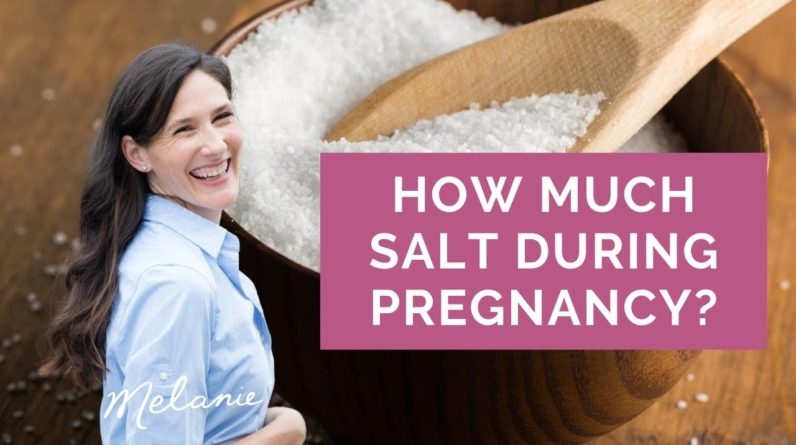
Salt is a seasoning that many
people struggle to go without, in fact it is the second most frequent food
additive by weight (trumped only by sugar). There are many health initiatives that recommend
that you reduce your intake of salt for general good health, but many women crave it during
pregnancy…..so if you're craving salt, and wondering "how much salt can I have during
pregnancy?", you've come to the right place! Stay tuned, and I'll let you know the answer! As a dietitian who specializes in pregnancy
and infant nutrition, I'm passionate about helping moms make the right choices during
the critical first thousand days of life. My name is Melanie McGrice, and I'm here to guide
you through the journey of pregnancy nutrition. Salt (or sodium chloride) is an essential
nutrient, meaning that our body can't make it and we need to consume it as part of our
diet. It's needed in small amounts, every day, to help maintain the body's fluid levels and
is also involved in muscle and nerve function. However, having an excessive intake
of salt has been associated with high blood pressure and an increased
risk for cardiovascular disease.
Many people consume way too much salt and
as a result, many health authorities advise of salt reduction across the board. The upper
limit for the general population according to The National Health and Medical Research
Council has been set at 2300 milligrams sodium per day (which is equal to around
6 grams of salt, or about 1 teaspoon). During pregnancy, many women experience
hypertensive disorders of pregnancy, including preeclampsia and gestational
hypertension. And those who do develop these disorders have an increased risk of type 2
diabetes and cardiovascular disease later in life. As dietary changes, like sodium
reduction, are the core for the management of hypertensive disorders in
the general population, researchers have questioned whether the same reductions
should be recommended to pregnant women. However, during pregnancy, a woman's physiology
is different to that of a non-pregnant person's. Her blood volume expands by about 50% and salt
actually helps with this process through its involvement in fluid balance helping to regulate
blood pressure and uteroplacental circulation. This doesn't necessarily mean that pregnant
women need more salt, but the clinical practice guidelines indicate that a salt-restricted
diet (which is equal to less than 5 grams of salt per day) shouldn't be encouraged
even in those with pre-existing high blood pressure or to reduce or manage hypertensive
disorders like preeclampsia.

So in short, during pregnancy, salt recommendations
are the same as the general population. This being said, as I mentioned, many people
are consuming too much salt and in many cases, this salt intake comes from highly processed
foods, instead of salt added to home cooked meals at the table. The concern with having
a diet high in these types of food isn't only their high salt content, but also their
hyper palatability, inability to keep you feeling full and lack of beneficial nutrients.
This means that they are easily overconsumed (which may lead to unwanted weight gain) and can
displace other important nutrients in the diet. These are not the kinds of foods you want to
include in your pregnancy diet. Rather focus your attention on whole, minimally processed
foods such as fresh fruits and vegetables, lean proteins, wholegrains and healthy fats,
adding a small amount of salt and other seasoning as needed to meet your needs, especially if
you are struggling with nausea or vomiting.
I'd really appreciate it if you could show
your support for this video by giving it a thumbs up and subscribing to my channel to stay
updated on new content. If you have any questions or recommendations for future videos, leave a
comment in the comment section. I love getting feedback from my viewers. If you want some tips
for nourishing meal ideas, download my free meal plan from melaniemcgrice.com/pregnancy.
And I'll see you next time!.







